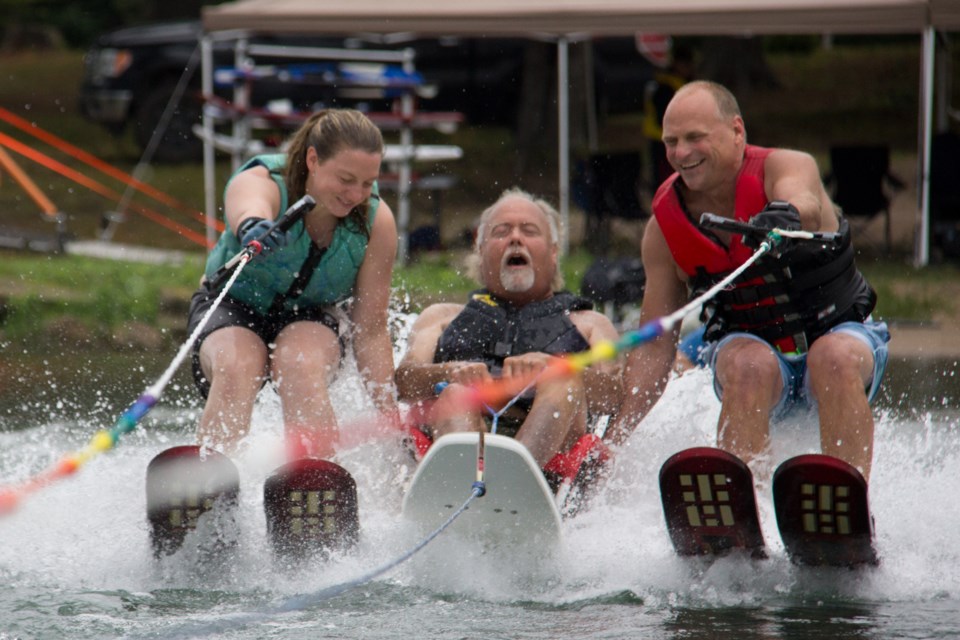SkiAbility Algoma — a non-profit volunteer-run group that offers ‘adaptive waterskiing for persons with various disabilities’ — has been tearing up the St. Mary's River all summer long, so on Saturday SooToday headed out for the last session of the season and talked to participants about why the program is so special.
Suzanne Becker & Johnathon McReavy
Suzanne Becker started bringing her son Johnathon McReavy, 32, to the SkiAbility clinics last year.
Johnathon has autism and is non-verbal.
He’s a very active guy who never stops walking around even when everyone else is seated.
He’s usually seen holding a little toy monster truck and tapping it’s wheels so that they make a click sound he seems to like.
Johnathon enjoys other outdoor activities like going out on ATVs, snowmobiling, and getting in the water on a 3-seat inflatable Mabel – it’s sort of like tubing.
As soon as Suzanne heard about SkiAbility she knew that Johnathon would like it.
“A great thing about SkiAbility is the social interaction. Here, everyone accepts him for who he is. Often when we go out in public we have to explain to everyone about why he does certain thing but here everyone just accepts him,” said Becker referring to how Johnathon will often wander around, get close to people, and dance and make screeching noises when he’s happy or excited.
Becker said SkiAbility has given her the amazing opportunity of connecting with her son by sharing in something they are both interested in.
When Becker was young her favourite activity was waterskiing and before SkiAbiility it had been 10 years since she got out on the water.
She said she never imagined being able to do something like waterskiing with her son.
“It’s just so awesome that I can share this with him. That’s a dream I never thought could happen. I never thought that he’d be able to waterski. Parents always get to share things with their kids but I’ve never had that before. Usually the things he does are just for him but being able to do this and go up right beside him, it’s beyond words how we’re able to do that,” said Becker.
Quinn Currie
Quinn Currie, 18, is in his ninth year of attending SkiAbility clinics.
Quinn has spina bifida and hydrocephalus, a neural issue that has left him in a wheelchair since he was 13.
Despite his disability, Quinn is probably more active than most, going to the gym and participating in archery, sledge hockey, and other sporting activities.
He loves that he can add waterskiing to his list of things he does.
“Its such a great sport, going out on the water is a fantastic upper body workout,” said Quinn.
Quinn highlighted the freedom that he has enjoyed since getting involved with SkiAbility.
“It lets me be able to be out on the lake with friends and do something that I never knew existed until I started actually started doing it. I’ve loved it from day one and on my first day I knew I’d do it every year after,” he said.
Heidi & Nick Baggs
Heidi Baggs, 14, is deaf.
Coming to SkiAbility is a way for her to overcome communication issues.
“Everyone here is really tolerant of everyone’s unique situation. It’s such a supportive environment. It gives Heidi the confidence to get out on to the water,” said Heidi’s dad Nick Baggs.
Heidi’s other go to activity is horse riding; she’s been with Therapeutic Ride Algoma for 4-5 years.
Nick found out about SkiAbility and thought Heidi might enjoy it.
Heidi’s first time at a clinic she couldn’t do it however they went out to try again and once she got out there she really took to it.
She has three older brothers who might also like to go out with her on the water however she prefers that she get’s to go to SkiAbility alone.
“It’s good because it’s something that she does that her brothers don’t do. We’re supportive of her; this is sort of ‘her thing’.”
Nick said that at SkiAbility clinics Heidi really gains of sense of independence and she is given lots of control in what she does.
“Everyone has a different situation her but the sense of freedom that everyone enjoys is amazing,” said Nick.
How it all works
Using adaptive watersports equipment, each ride is customized to the water-skier’s abilities.
They will often take people out on ‘sit-skis’, single-ski sit-down devices that can be custom-fitted with different modular parts to each person’s particular needs.
Needs vary greatly as participants come with a wide range of disabilities — some physical, others mental — however all are accommodated and welcome.
A SkiAbility day out on the water is referred to as a clinic.
Participants sign up ahead of time and people show up throughout the day and in roughly 20 minute increments get their turn on the water.
They’re so popular that the volunteer staff hardly has time to take a break.
This summer there were four Algoma SkiAbility clinics all held at Bell’s Point Beach Campground, which lets the group hold clinics there at no charge.
